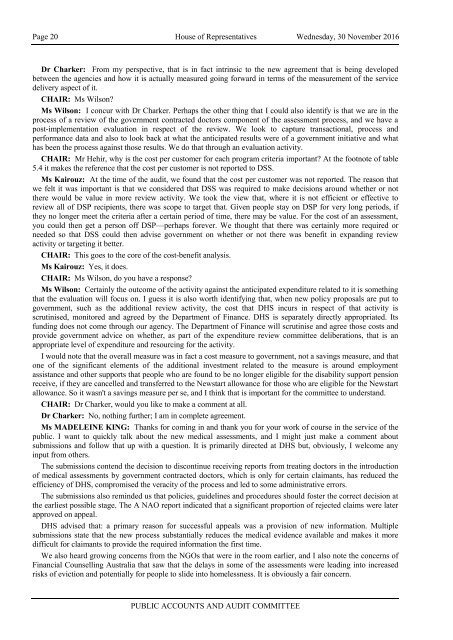Proof Committee Hansard
2hbqb7M
2hbqb7M
You also want an ePaper? Increase the reach of your titles
YUMPU automatically turns print PDFs into web optimized ePapers that Google loves.
Page 20 House of Representatives Wednesday, 30 November 2016<br />
Dr Charker: From my perspective, that is in fact intrinsic to the new agreement that is being developed<br />
between the agencies and how it is actually measured going forward in terms of the measurement of the service<br />
delivery aspect of it.<br />
CHAIR: Ms Wilson?<br />
Ms Wilson: I concur with Dr Charker. Perhaps the other thing that I could also identify is that we are in the<br />
process of a review of the government contracted doctors component of the assessment process, and we have a<br />
post-implementation evaluation in respect of the review. We look to capture transactional, process and<br />
performance data and also to look back at what the anticipated results were of a government initiative and what<br />
has been the process against those results. We do that through an evaluation activity.<br />
CHAIR: Mr Hehir, why is the cost per customer for each program criteria important? At the footnote of table<br />
5.4 it makes the reference that the cost per customer is not reported to DSS.<br />
Ms Kairouz: At the time of the audit, we found that the cost per customer was not reported. The reason that<br />
we felt it was important is that we considered that DSS was required to make decisions around whether or not<br />
there would be value in more review activity. We took the view that, where it is not efficient or effective to<br />
review all of DSP recipients, there was scope to target that. Given people stay on DSP for very long periods, if<br />
they no longer meet the criteria after a certain period of time, there may be value. For the cost of an assessment,<br />
you could then get a person off DSP—perhaps forever. We thought that there was certainly more required or<br />
needed so that DSS could then advise government on whether or not there was benefit in expanding review<br />
activity or targeting it better.<br />
CHAIR: This goes to the core of the cost-benefit analysis.<br />
Ms Kairouz: Yes, it does.<br />
CHAIR: Ms Wilson, do you have a response?<br />
Ms Wilson: Certainly the outcome of the activity against the anticipated expenditure related to it is something<br />
that the evaluation will focus on. I guess it is also worth identifying that, when new policy proposals are put to<br />
government, such as the additional review activity, the cost that DHS incurs in respect of that activity is<br />
scrutinised, monitored and agreed by the Department of Finance. DHS is separately directly appropriated. Its<br />
funding does not come through our agency. The Department of Finance will scrutinise and agree those costs and<br />
provide government advice on whether, as part of the expenditure review committee deliberations, that is an<br />
appropriate level of expenditure and resourcing for the activity.<br />
I would note that the overall measure was in fact a cost measure to government, not a savings measure, and that<br />
one of the significant elements of the additional investment related to the measure is around employment<br />
assistance and other supports that people who are found to be no longer eligible for the disability support pension<br />
receive, if they are cancelled and transferred to the Newstart allowance for those who are eligible for the Newstart<br />
allowance. So it wasn't a savings measure per se, and I think that is important for the committee to understand.<br />
CHAIR: Dr Charker, would you like to make a comment at all.<br />
Dr Charker: No, nothing further; I am in complete agreement.<br />
Ms MADELEINE KING: Thanks for coming in and thank you for your work of course in the service of the<br />
public. I want to quickly talk about the new medical assessments, and I might just make a comment about<br />
submissions and follow that up with a question. It is primarily directed at DHS but, obviously, I welcome any<br />
input from others.<br />
The submissions contend the decision to discontinue receiving reports from treating doctors in the introduction<br />
of medical assessments by government contracted doctors, which is only for certain claimants, has reduced the<br />
efficiency of DHS, compromised the veracity of the process and led to some administrative errors.<br />
The submissions also reminded us that policies, guidelines and procedures should foster the correct decision at<br />
the earliest possible stage. The A NAO report indicated that a significant proportion of rejected claims were later<br />
approved on appeal.<br />
DHS advised that: a primary reason for successful appeals was a provision of new information. Multiple<br />
submissions state that the new process substantially reduces the medical evidence available and makes it more<br />
difficult for claimants to provide the required information the first time.<br />
We also heard growing concerns from the NGOs that were in the room earlier, and I also note the concerns of<br />
Financial Counselling Australia that saw that the delays in some of the assessments were leading into increased<br />
risks of eviction and potentially for people to slide into homelessness. It is obviously a fair concern.<br />
PUBLIC ACCOUNTS AND AUDIT COMMITTEE















